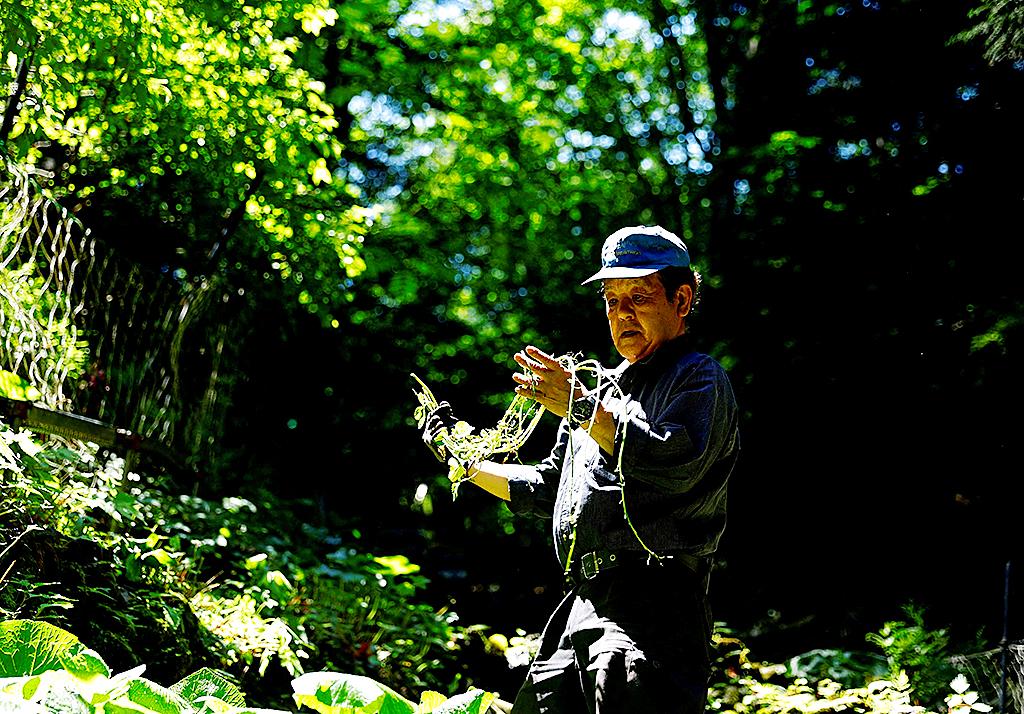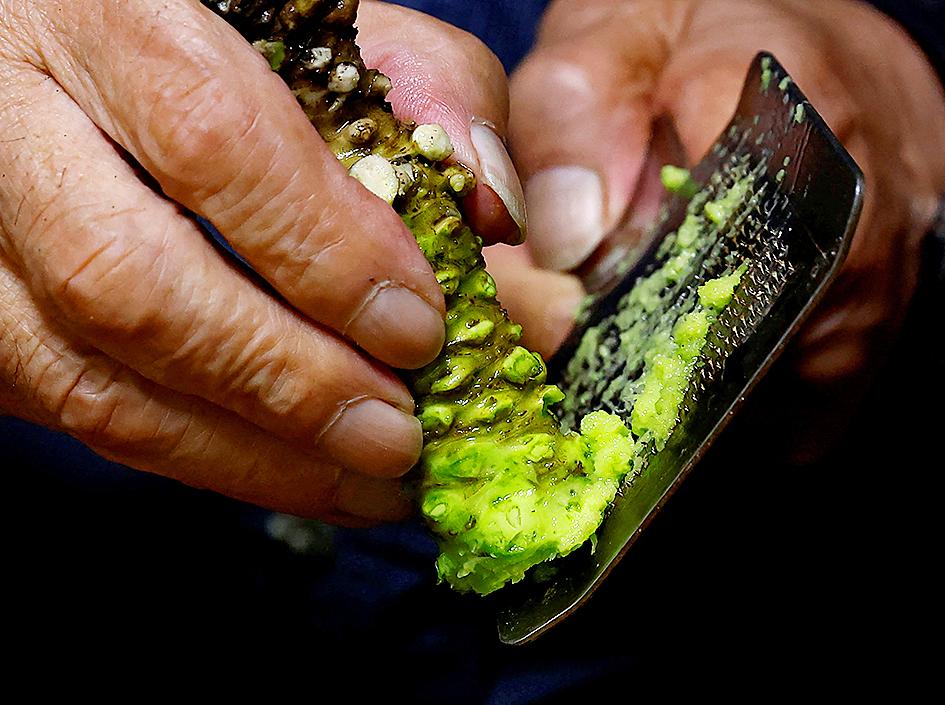Masahiro Hoshina, a Japanese farmer, starts worrying about typhoon season months before it begins, haunted by memories of the heavy rains and landslides that washed away wasabi farms during one 2019 storm.
“Recently the power of typhoons feels totally different from before due to global warming. It’s getting stronger,” said the 70-year-old farmer in Okutama, west of downtown Tokyo.
“Since it’s happened once, there’s no guarantee it won’t happen again.”

Photo: Reuters
Wasabi, the tangy Japanese horseradish that’s an essential part of sushi and dabbed onto slices of raw fish or into bowls of soba buckwheat noodle soup, is usually grown along streams in narrow valleys, leaving farms prone to disasters.
Typhoon Hagibis, which slammed into eastern Japan in 2019, slashed production in Okutama by nearly 70 percent the next year. The need for replanting and careful tending meant it’s taken nearly three years for sushi farms there to recover.
Experts say global warming is affecting production not only by increasing the number and severity of storms, but with rising temperatures that threaten growth of the plants, which need to be in water a consistent 10-15 degrees Celsius year-round.

Photo: Reuters
A lack of wasabi could also endanger traditional Japanese foods such as sushi and sashimi, where the tang of the wasabi is used as a contrast with raw fish.
Weather isn’t the only obstacle wasabi farmers face. A drop in rural populations due to aging means there are no successors. Because of the two factors, the output of wasabi grown in clear-flowing water, like at Hoshina’s farm, had fallen to half that of 2005, according to the Agriculture Ministry.
Norihito Onishi, head sales manager at a chain of soba buckwheat noodle restaurants called Sojibo, has seen his business directly affected by wasabi shortages and supply problems.
The restaurants were long known for allowing customers to grind their own wasabi roots to produce the spicy paste used as a condiment for soba. But they’ve had to mostly give this up.
“In the past, we served all the cold soba noodles with a piece of raw wasabi, but now we can no longer do that,” Onishi said.
Though wasabi root was plentiful when the restaurant first opened 30 years ago, Onishi said over the last 5 to 10 years there have been times when he couldn’t get any at all. The precious root is now made available only for certain types of dishes.
“If this unstable supply of wasabi persists, due to many factors including global warming, we will face a situation where we need to come up with other ways to overcome the problem so we don’t end up not serving raw wasabi at all,” said Onishi.

A vaccine to fight dementia? It turns out there may already be one — shots that prevent painful shingles also appear to protect aging brains. A new study found shingles vaccination cut older adults’ risk of developing dementia over the next seven years by 20 percent. The research, published Wednesday in the journal Nature, is part of growing understanding about how many factors influence brain health as we age — and what we can do about it. “It’s a very robust finding,” said lead researcher Pascal Geldsetzer of Stanford University. And “women seem to benefit more,” important as they’re at higher risk of

March 31 to April 6 On May 13, 1950, National Taiwan University Hospital otolaryngologist Su You-peng (蘇友鵬) was summoned to the director’s office. He thought someone had complained about him practicing the violin at night, but when he entered the room, he knew something was terribly wrong. He saw several burly men who appeared to be government secret agents, and three other resident doctors: internist Hsu Chiang (許強), dermatologist Hu Pao-chen (胡寶珍) and ophthalmologist Hu Hsin-lin (胡鑫麟). They were handcuffed, herded onto two jeeps and taken to the Secrecy Bureau (保密局) for questioning. Su was still in his doctor’s robes at

Last week the Democratic Progressive Party (DPP) said that the budget cuts voted for by the China-aligned parties in the legislature, are intended to force the DPP to hike electricity rates. The public would then blame it for the rate hike. It’s fairly clear that the first part of that is correct. Slashing the budget of state-run Taiwan Power Co (Taipower, 台電) is a move intended to cause discontent with the DPP when electricity rates go up. Taipower’s debt, NT$422.9 billion (US$12.78 billion), is one of the numerous permanent crises created by the nation’s construction-industrial state and the developmentalist mentality it

Experts say that the devastating earthquake in Myanmar on Friday was likely the strongest to hit the country in decades, with disaster modeling suggesting thousands could be dead. Automatic assessments from the US Geological Survey (USGS) said the shallow 7.7-magnitude quake northwest of the central Myanmar city of Sagaing triggered a red alert for shaking-related fatalities and economic losses. “High casualties and extensive damage are probable and the disaster is likely widespread,” it said, locating the epicentre near the central Myanmar city of Mandalay, home to more than a million people. Myanmar’s ruling junta said on Saturday morning that the number killed had